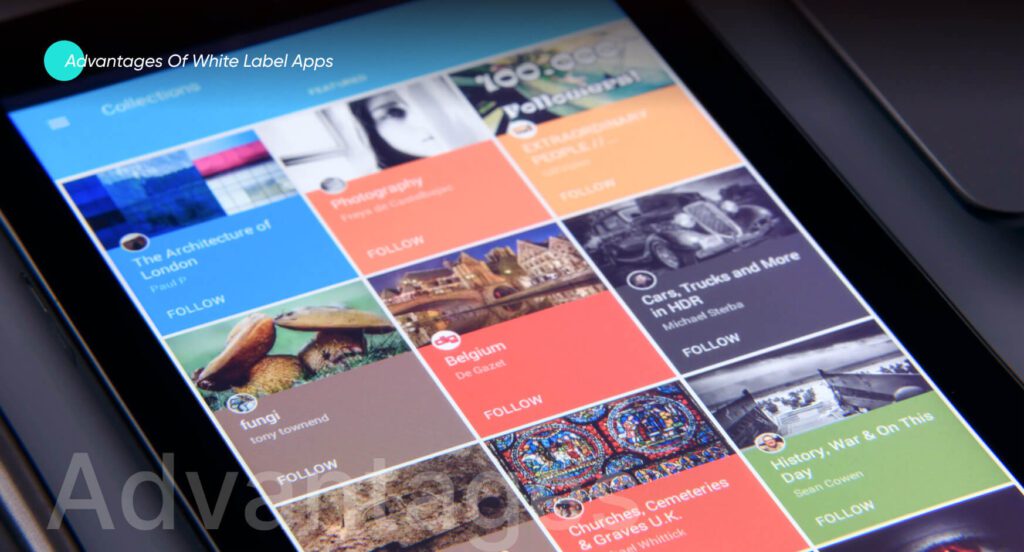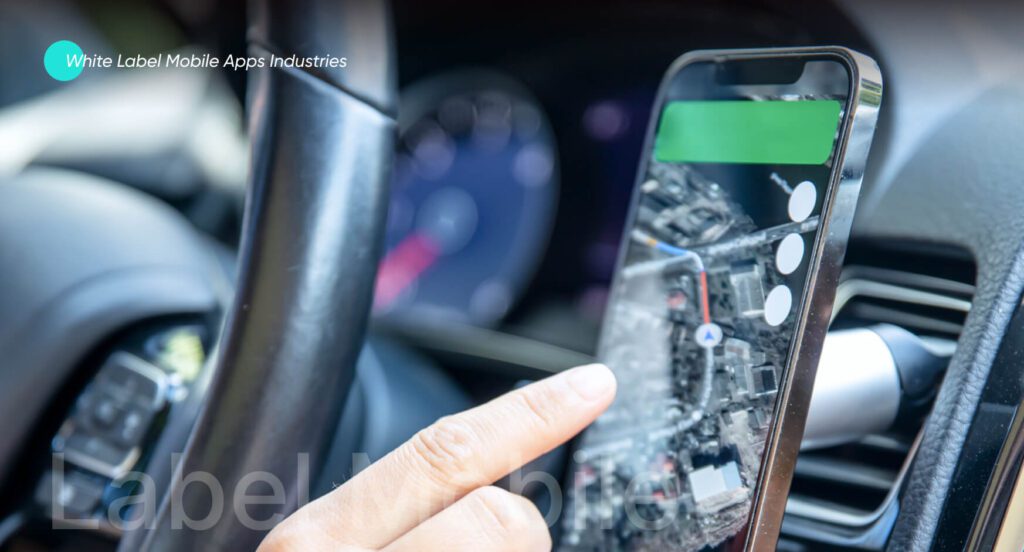What is a White Label App?
A white label app is a software application built by one company and rebranded and resold by another company as their product. These apps are created as generic, which means that they don’t display branding elements associated with the developer. These apps are also easily customizable, allowing the acquiring company to apply its branding features, including logos, colors, typeface, and other visual elements.
White label apps are ideal for businesses seeking to avoid significant app development costs and save time and resources. The core capabilities and features of the app remain consistent throughout its usage by various companies, with the exception of the visual components, which can be customized to resonate with each business’s branding identity.
White label apps are used in numerous industries, including e-commerce, food and beverage, travel and hospitality, ride-sharing, event management, healthcare, educational institutions, and finance. They play a key role in providing optimized and economical digital services to customers.
This article thoroughly explains what are white label apps while highlighting their significance for various industries.
To build an app that stands out in the competitive market. Check out our mobile app develeopment services ![]()
What is the difference between white label apps and custom apps?
White label and custom apps are created to serve different purposes. A third-party company develops white label apps that another company can rebrand as their product. Conversely, custom apps are exclusively produced from zero specifically for a particular organization or individual to fulfill their specific requirements and preferences.
As white label apps are already developed, they only require customization, considerably reducing time and costs. Custom apps are created from scratch according to the specific requirements, which requires more time and money to develop and design the app.
Custom apps provide the maximum level of flexibility for customization as they are created from scratch and in conformity with the specific requirements of a business. On the other hand, white-label apps provide limited customization and fall short of delivering the same level of flexibility as custom apps.
White label apps are typically maintained and supported by the original developers, and they are responsible for providing updates, bug fixes, and introducing new features. However, custom apps receive support and maintenance from the developers who created them. However, this authorizes more control and dedicated support to the app-owning company but also requires more resources and careful planning.
White label apps‘ ownership, branding, and intellectual rights are licensed or sold to the companies that purchase them. Under these rights, these companies can add branding elements, such as logos, colors, and typefaces. In contrast, custom apps’ ownership, branding, and intellectual rights are fully retained by the specific company or individual who owns the app.
Advantages of white label apps

The following benefits make white label mobile apps the best choice for businesses looking to save costs and time and take advantage of existing functionality and features while sustaining brand identity without compromising user experience.
Cost-effectiveness
Developing a white labelling app from scratch takes a considerable toll on money and resources. White-label mobile apps provide an excellent cost-effective alternative to businesses as they do away with the need for sweeping development costs and resources.
Time efficiency
Developing an app from zero requires several months. In order to tackle that, white-label apps offer a readily available solution, which reduces development time and enables businesses to launch their apps rapidly.
Customization
White label apps provide the flexibility to customize the app’s branding, design, and features synchronized with a business’s specific requirements.
Quick market entry
With a white label app, businesses can enter the market swiftly. The pre-developed app allows them to focus on marketing and target audiences, helping them gain a competitive advantage by launching their app rapidly.
Pre-developed functionality
White label apps come with an array of pre-developed features and functionalities. Businesses can harness these pre-built functionalities, such as payment processing, push notifications, user authentication, and more, without developing them from the ground up.
Mobile App Develeopment Services
Typically, white label mobile app developers offer constant support and maintenance, ensuring the app remains functional and updated. As such, this support can spare businesses from the trouble of overseeing maintenance.
Scalability
White label apps can handle a growing user base, increased traffic, and additional features. This scalability allows businesses to expand their app as their needs evolve, and user demand increases.
Branding Prospects
White label apps provide businesses with a platform to fortify their brand identity. The app can be branded with the company logo, colors, typeface other visual elements, consolidating brand recognition and loyalty among users.
Competitive Advantage
White label mobile apps also play a crucial role in helping businesses gain a competitive advantage. By offering a dynamic user experience, a white label app can help companies to attract more customers.
Disadvantages of White-Label Apps
Undoubtedly, white label app development offers numerous benefits. However, it is essential to evaluate some drawbacks too. Here are some disadvantages usually associated with white label apps.
Minimal customization
While white label apps offer customization, they are still limited when offering extensive customization for an app. It can be a shortcoming for businesses with advanced or unique requirements, as white label apps cannot handle complex customizations.
Limited control
Third-party developers build white label apps, meaning businesses have restricted control over the fundamental code and infrastructure. This lack of control can limit the ability to make significant modifications or address specific technical issues promptly. Businesses depend on the app developer for updates and bug fixes, which can lead to overreliance and likely delays.
Risk of similarity
The risk of similarity is always present since white label apps are available to various businesses. The risk includes identical and overlapping features and designs among different brands using the same white label app. Without a doubt, it can be detrimental to a business as the brand might lose its unique value proposition and lose its identity amid competitors.
Diminished uniqueness
While white label apps offer basic features, they often need more innovative or cutting-edge functionalities that can set a business apart from competitors. Companies looking to provide a unique app experience or incorporate advanced features may find the limitations of white label solutions restrictive. They may require a more customized and tailored development approach.
Overdependence on the app developer
Businesses using white label apps become reliant on the app developer for ongoing support, maintenance, and updates. If the developer suspends their services or fails to deliver adequate support, businesses may face challenges in upkeeping the app successfully. Hence, it is indispensable to check the reputation and reliability of white label app developers before making. It’s crucial to assess the market reputation of the white label app developer before striking a deal.
Which industries use white label mobile apps?

Numerous businesses in diverse industries use white label mobile apps. These businesses aim to avoid extensive development costs and time and opt for white label apps. Here are some industries that commonly use white label apps.
Retail and e-commerce
White labelling apps enable retailers and e-commerce store owners to develop branded mobile shopping apps, allowing customers to browse products, make purchases, and track orders.
Fitness and wellness
White label mobile apps are popular in the fitness industry, enabling gyms, personal trainers, and wellness centers to offer branded fitness apps focusing on track, workout, and meal planning.
Travel and hospitality
Hotels, resorts, airlines, tour operators, and travel agencies use white label apps to create their booking platforms, offering guests personalized experiences, room reservations, ticket booking, concierge services, and more.
Food and beverage
Restaurants, cafes, and food delivery businesses often use white label apps to develop online ordering and delivery platforms, providing customers a rewarding experience.
Healthcare and telemedicine
White labelling apps are crucial in telemedicine, allowing healthcare providers to offer virtual consultations, appointment scheduling, prescription management, and remote patient monitoring.
Transportation and logistics
Companies in the transportation and logistics sector use white label apps for managing fleet operations, tracking shipments, and providing real-time updates to customers.
Banking and Finance
White label mobile apps allow banks and financial institutions to develop mobile banking and payment apps, providing customers with secure access to their accounts, transactions, and financial services.
Educational sector
Educational institutions and e-learning platforms leverage white label apps to create personalized learning experiences, course management systems, and online tutoring platforms.
On-demand services
White label mobile apps are power-on-demand service platforms in various industries, including ride-sharing, food delivery, home services, and professional services, connecting customers with service providers.
Event management
White label apps are used for event management, providing features like event registration, ticketing, schedules, networking, and personalized event experiences.
How much does white label app cost in comparison to custom apps?

A significant difference exists between the development cost of white-label mobile apps and custom apps. Basic white label apps with limited functionality can start at around $1,000, while more advanced apps with complex features and extensive customization can range from $50,000 to $200,000 or more. On the other hand, custom apps can cost from $300,000 to over $1 million. It is imperative to consult various development agencies to get an accurate quote based on the specific requirements of your projects.
Elevate your business with our seamless and scalable app development solutions. Talk to our experts. ![]()
FAQs
What is white label SaaS platform?
A white label SaaS platform is a pre-built software solution developed by one company that can be rebranded and customized by another company. In this way, companies don’t have to develop the software from scratch. The provider of the white label SaaS platform takes care of the software’s development, maintenance, and support, while the reselling company focuses on marketing and selling the product as their own
What is the difference between a white-label and a private-label app?
A white-label mobile app refers to a pre-built software solution developed by a third-party company that can be rebranded and customized by different companies. On the other hand, a private label app is a custom-built solution created from scratch for a specific company, exclusively tailored to their unique requirements and branded under their name.
Are white label mobile apps legal?
Yes, white-label mobile apps are legal as long as they are used in compliance with the original app developer’s terms and conditions. Reselling companies typically agree with the app developer, outlining the rights and responsibilities of each party.
Gohar is a seasoned IT writer specializing in leading technologies. He holds a Diploma and Bachelor's degree from the University of London, with professional experience spanning over five years in the IT sector. His expertise involves a keen focus on mobile applications, web apps, blockchain, content management systems, e-commerce, and fintech. Beyond the professional field, Gohar is an avid reader and reads extensively about emerging and innovative technologies.